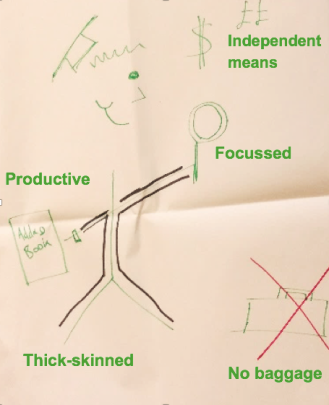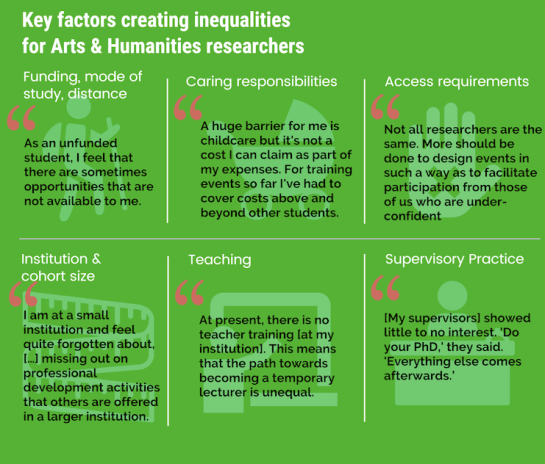The ideal researcher has no baggage
In a workshop I ran last year, I asked a group of doctoral researchers to draw “the ideal PhD student.” Beyond being a fun ice-breaker, the point of the task is to spark conversations about the skills, competencies and behaviours which doctoral researchers need for, or develop through their doctorates.

In this particular workshop, though, one of the participants drew something rather different. Subverting the task, they drew what they felt the institution expected doctoral researchers to be like. In their drawing, we see the institution’s presumed ideal: an independently wealthy, young, unattached, able-bodied, thick-skinned—probably white and male—individual who has no responsibilities other than their PhD and is therefore able to be focussed and productive and devote all their time to doctoral research. In short, the ideal PhD student has no baggage.
The point the participant was making was that the way institutions conceptualise doctoral candidates—as individuals without baggage—has very real consequences for those who do not fit this profile. Which is to say, most people. Because, of course, all doctoral researchers, and indeed all researchers, have some kind of baggage. As Emily Hendersen of the In Two Places at Once project, a study exploring how academics’ caring responsibilities intersect with conference attendance notes, “academics are not unencombered individuals but nodes within network of relationships” (Hendersen; listen to her talk here).
This theme came up again and again in my research into the professional development behaviours and experiences of Arts and Humanities doctoral and early career researchers. Many respondents felt frustrated, isolated, or abandoned because their “baggage” was not being accounted for, meaning they lost out on valuable opportunities to develop themselves and their careers.
As the data we collected through the survey continuously highlights, factors as diverse as,
- Funding status
- Mode of study
- Distance from institution
- Access requirements
- Caring responsibilities
- Work commitments
- Previous professional experience
Can limit doctoral researchers’ ability to access professional development opportunities. In other words, doctoral researcher enjoy highly unequal access to professional development opportunities.
Other important factors creating inequalities operate at institutional level, for example:
- Location of institution
- Size of institution
- Size of doctoral cohort
- Support provision
- Teaching
- Supervisory practice

Unsurprisingly, in my sample, those studying part-time were significantly more likely to have had a previous career: 75% compared to 47% in full-time students. If we consider, in addition, that of part-time respondents, 72% identified as female, and that women are statistically more likely to be primary caregivers, then it starts to become clear how identities intersect with one another in ways which further constrain doctoral researchers’ ability to engage in professional development.

An important blind spot of this research is that it did not explore questions of race, religion, or disability. This is a shortcoming, as we can only surmise how these intersecting identifies can further limit someone’s access to development opportunities. But what we can suggest by looking at this data is that inequalities of access to professional development intersect with existing inequalities, undermining, in turn, the diversity of researchers as a workforce.
When we make assumptions about the identities or unencomberedness of researchers we make academic life difficult—if not impossible—for certain, already marginalised, groups, meaning only those who most fit this expected profile, or who most perform unencomberedness are likely to succeed in academia.
Universities, funders, and researcher developers have a duty to provide equal access to opportunities to all doctoral researchers, which means developing thoughtful, and inclusive development provision and conducting further research to better understand the barriers researchers come up against every day.

Download and read the full report One Size Does Not Fit All from the Vitae website here.
Recently experienced this when asked to change my location at short notice – had expected to be moving away for 2 years, was asked to stay for… some period of time (might be 9 might be 12 months who knows.) Id made a plan to move into a new place, I was packed to leave the place where the lease expired that week. Although my supervisors had a fair point on the physics case they seemed completely blind to the fact id be homeless and tenancies dont do ‘however long you fancy’ on my budget/ job title.